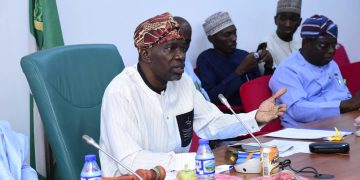By Paul Effiong, Abuja
Stakeholders have painstakingly examinined the roots cause of insecurity and poverty in Nigeria leading to a strong case for inclusive governance, robust stakeholder engagement, as well as sound policy frameworks as vital tools for stabilizing the nation and achieving sustainable development.
In a well researched published book by Dr.Bassey Ita Etim Ikang which is divided into seven thematic chapters, provides an in-depth analysis of the nexus between insecurity, poverty, corruption, and leadership failure, while proposing pragmatic solutions to reposition Nigeria’s socio-economic and political landscape.
The book further highlights how poor leadership and weak institutional frameworks continue to deepen national vulnerability, particularly in the face of climate change, inequality, and economic mismanagement even as its emphasized youth unemployment, corruption, and governance failure which are key drivers of insecurity, citing the activities of Boko Haram, ISWAP, kidnappers, bandits, and illegal miners as major threats to national stability.
The book also condemns separatist movements and political elites who exploit public frustration for selfish ends, warning that without urgent reforms, Nigeria risks deeper social fragmentation.
Citing data from the World Bank and the National Bureau of Statistics (NBS), the author reveals that over 135 million Nigerians currently live in multidimensional poverty, while insecurity continues to choke economic growth and productivity.
It also identifies corruption, indiscipline, and poor leadership as the major stumbling blocks to progress and urges a return to evidence-based planning, credible data systems, and merit-driven leadership selection.
The document further calls for reforms that prioritize local production, human capital development, and the elimination of policy inconsistencies that discourage investment across Nigeria.
According to the research by the writer, achieving sustainable peace and development requires a bold policy shift anchored on inclusivity, competence, and accountability while its proposes the creation of cottage industries across all 774 local government areas to boost rural economies, create jobs, and reduce the pressure on urban centers.
The report also praises the President Tinubu administration’s steps toward livestock reform and ranching, describing them as practical measures to curb herder-farmer clashes and foster economic diversification across Nigeria.
In conclusion, the book advocated for a coordinated national response to Nigeria’s twin crises of insecurity and poverty through visionary leadership, coherent policies, and participatory governance.
It stresses that only by confronting corruption, empowering communities, and leveraging the nation’s vast human and natural resources can Nigeria shed its tag as the “poverty capital of the world” and chart a new path toward national peace, stability, and shared prosperity.











































